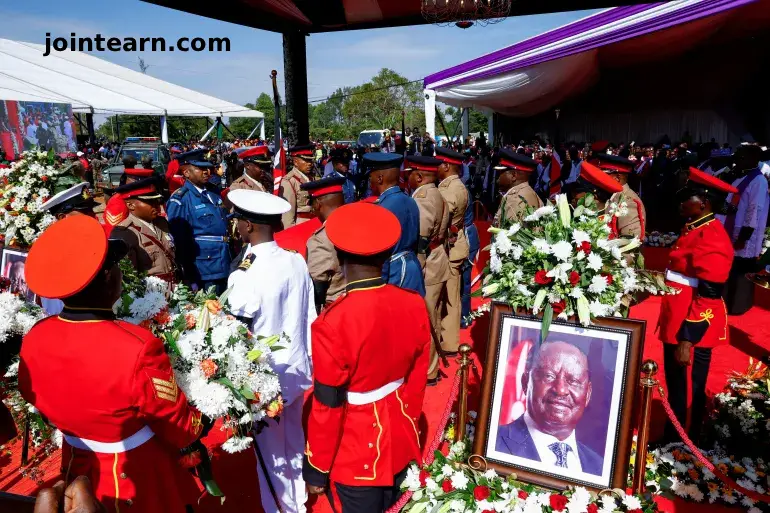
Bondo, Kenya – October 19, 2025 — Kenya’s revered opposition leader and former Prime Minister Raila Amolo Odinga has been laid to rest at his ancestral home in Bondo, Siaya County, marking the end of an era for one of Africa’s most influential political figures. The burial followed days of emotional memorials and public vigils that drew massive crowds — some turning deadly — as the nation bid farewell to the man many called “Baba,” Swahili for “father.”
Odinga, 80, passed away last Wednesday in southern India after suffering a suspected heart attack while receiving medical treatment. His death plunged Kenya into mourning, with tributes pouring in from across Africa and beyond, recognizing his lifelong struggle for democracy and social justice.
A Final Farewell to a Pan-African Statesman
The final ceremony was held at the Jaramogi Oginga Odinga University of Science and Technology, named after his late father, Kenya’s first vice president. Thousands of mourners — from heads of state to ordinary citizens — gathered to pay tribute.
President William Ruto, former President Uhuru Kenyatta, and Nigeria’s ex-President Olusegun Obasanjo attended, alongside African Union representatives and opposition leaders from several countries.
“Raila was not only a Kenyan hero but a respected statesman across Africa,” said President Ruto in his eulogy. “He united people, even in times of deep division. Kenya has lost a true patriot.”
Odinga’s coffin, draped in the national flag, was escorted by the Kenya Defence Forces (KDF) and accompanied by traditional Luo rites before being interred with full military honors at his family homestead in Kang’o Ka Jaramogi.
Days of Mourning Marked by Tragedy
The path to Odinga’s burial was marred by sorrow as five people died and hundreds were injured during stampedes at memorial events in Nairobi and Kisumu. Thousands had gathered for public viewings of his body over the past three days, some waiting overnight to glimpse the casket of the man many considered Kenya’s moral compass.
According to Al Jazeera’s Catherine Soi, there were “moments of chaos” even during the final burial service as mourners surged toward the gates of the burial site before security personnel restored order.
“People here want to honor him for all the sacrifices he made,” Soi reported. “For many Kenyans, this is not just a funeral; it’s the end of a political generation.”
A Legacy of Resistance and Reform
Raila Odinga’s political journey spanned six decades, defined by his unyielding fight for democracy, constitutional reform, and social equity. He was detained multiple times during the one-party era of the 1980s and played a pivotal role in the country’s transition to multi-party democracy in the 1990s.
Serving as Prime Minister from 2008 to 2013, Odinga was central to the reconciliation process following the 2007–2008 post-election violence that claimed over 1,000 lives. Despite contesting — and losing — five presidential elections, he remained a towering opposition figure and a symbol of democratic resilience.
His political alliances were as complex as they were transformative. He famously shook hands with former rival Uhuru Kenyatta in 2018, ending years of political hostility, and later reached a political truce with President Ruto in early 2025, stabilizing Kenya after months of mass protests.
“I see him as one of those who fought for Africa’s second liberation,” said Erastus Mwencha, former Deputy Chairperson of the African Union. “His impact went far beyond Kenya.”
The Vacuum He Leaves Behind
Odinga’s death leaves the Azimio la Umoja coalition and the broader opposition in disarray, with no clear successor capable of commanding his level of grassroots loyalty. Political analysts warn that his absence could open a volatile period ahead of the 2027 elections, as competing factions vie for influence.
Despite never achieving the presidency, Odinga’s legacy as a democracy defender, reformist, and Pan-Africanist remains secure. The 2010 Constitution — widely regarded as one of Africa’s most progressive — stands as a testament to his vision for a fair and inclusive Kenya.
“Raila Odinga was the conscience of our nation,” said former Chief Justice Willy Mutunga. “He may not have sat in State House, but he reshaped Kenya’s destiny.”
A Nation United in Mourning
Flags flew at half-mast across Kenya and several neighboring countries as millions tuned in to televised coverage of the funeral. From Nairobi to Kisumu, streets were lined with banners reading “Baba Forever” and “The People’s President.”
As Odinga was laid to rest beside his late parents, emotional chants of “Baba! Baba!” echoed across Bondo — a fitting farewell to a man whose political life defined Kenya’s democratic journey.


Leave a Reply